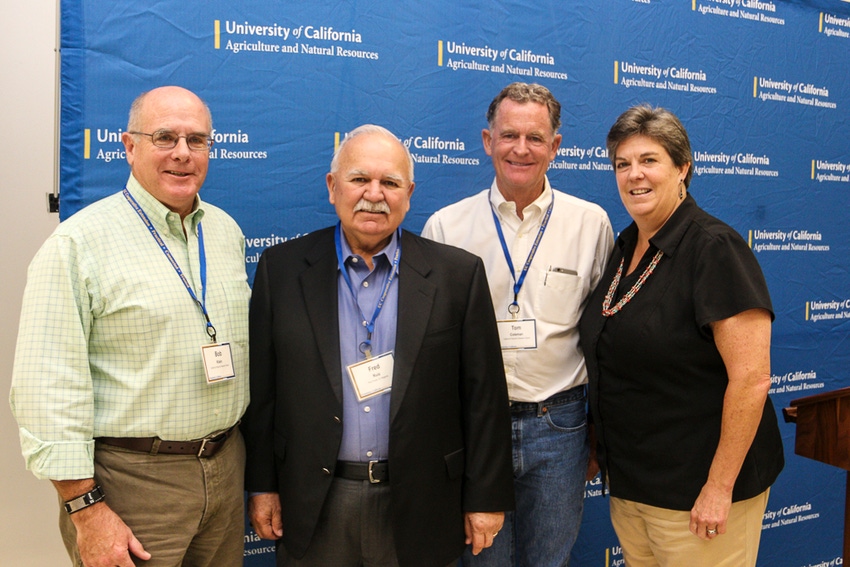
Two new endowed chairs within the University of California’s Division of Agriculture and Natural Resources (UCANR) will be funded from $1 million donated by the California Pistachio Research Board (CPRB).
The donation leverages an equal match UC President Janet Napolitano promised to dedicate in an effort to improve applied research funding at the land grant university. The money will fund applied research within the division’s cooperative extension program.
The announcement was made at the UC Kearney Agricultural Research and Extension Center by new UCANR Vice President Glenda Humiston, who in her first few months on the job indicates a desire to seek innovative ways to fund important agricultural research by the university.
Humiston told Western Farm Press that the funding is part of Napolitano’s presidential matching program for endowed chairs. In short, Napolitano said she would match $500,000 from industry or private contributions to create endowed chairs.
“I’m excited about this because it’s the first time we’ve done one of these,” Humiston said of the endowed chairs within UCANR.
Humiston said future endowed chairs within the UCANR system could be forthcoming as discussions are currently under way with organizations.
The two presidential endowed chairs will address various challenges facing tree nut growers, and not be solely dedicated to pistachios, said Bill Frost, associate vice president of UCANR.
“The Pistachio Research Board was very generous when they donated this money not to make it specific to pistachios,” Frost says. “This research can go to help other tree nut crops.”
The first chair will address tree nut genetics; a second will tackle soil science and plant water relations. According to Frost, who said the competitive application process will be open to cooperative extension advisors and specialists.
Because the positions will draw from existing UCANR staff the money invested from the endowments will supplement the university’s research and outreach budget to benefit tree nut programs. A group of university and industry officials will review proposals submitted and award the chairs accordingly, Frost says.
Frost expects to release requests for proposals shortly and have the chairs filled through the competitive application process by the first of the year. The positions will be awarded for five years with the opportunity for existing chairs to reapply if they wish.
Frost says a committee of industry and university officials will review the applications and award the chairmanships.
Industry reaction
Tom Coleman, chairman of the CPRB and a pistachio grower in Fresno and Madera counties says his organization remains committed to helping fund key research.
This philosophy of donating for university research stems from the early days of the pistachio industry to fund such things as research into Botryosphaeria, Coleman says. To date the CPRB has given over $4.5 million towards research projects in California.
“And we’re not done,” said Coleman of the desire to fund additional applied research.
Immediately pressing according to Coleman are issues related to climate change, drought and water availability. Not only did the lack of winter chill hurt growers this year with severely-reduced yields, but the lack of water has created soil salinity issues concerning to growers.
“We don’t know how long these trees can survive these saltier soils,” he said.
What growers and researchers are looking at right now is just how much winter chilling is needed, and at what temperatures, to adequately place pistachio trees into a dormant state where they will produce well the following year.
CPRB Manager Bob Klein says the need for research within the pistachio industry is particularly important given how relatively young it is compared to other tree nuts.
“We don’t have a long history here in California; we didn’t come in with the Spanish missions,” Klein said.
Young industry
“The reason we have pistachios growing in the United States is the USDA back in the late 1800s and early 1900s implemented a planned introduction program that brought pistachios into the desert Southwest for evaluation,” Klein said.
Later pistachios were planted and studied in the Chico, Calif. area, which led to the creation of commercial cultivars that are currently being planted today.
As pistachio acreage has grown to about 300,000 total acres Humiston points out that this expansion has happened on only a few varieties of root stock.
“This limits diversity and puts the industry at risk,” Humiston said. “One of the things we’re going to work on is finding new cultivars and options for growers as they move forward.”
Klein echoed the need for additional research dollars to grow with the industry as growers recognize and face various challenges that include micro and macro climate issues and regulatory changes.
Leading to the CPRB’s decision to fund university research is what Klein called a previous “de-emphasis in funding applied agricultural research” by the USDA and UC systems. Even then, Klein said money that was available in some cases went unspent because of a lack of people to do the work.
As a result, Klein says the pistachio industry has focused time, attention and funding to correct these issues. Not only has funding gone to the UC system, but Fresno State’s Jordan College of Agricultural Sciences and Technology was the recipient of a $1.5 million endowment in 2013 to fund a position and research programs there.
In addition to the latest funding from CPRB, the organization has worked closely with UCANR to bolster ag research by providing six-year funding for extension plant pathologists and integrated pest management programs at UC Kearney.
“These endowments are very important to continued research,” said Fred Ruiz, vice chairman of the UC Board of Regents.
Ruiz is also chairman emeritus and co-founder of Ruiz Foods in Dinuba, Calif.
For the latest on western agriculture, please check out Western Farm Press Daily and receive the latest news right to your inbox.
About the Author(s)
You May Also Like






